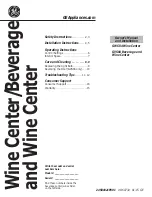
21
Note that increasing fusion temperature does not allow the stable dissolution of
more sample. It may quicken the dissolution speed, but when the disk will cool
down, a precipitate will appear, or the disk will be prone to spontaneous bursting.
The non-wetting agent (NWA)
The non-wetting agent (NWA) acts as a surfactant that makes the melt less prone
to sticking to platinumware. Non-wetting agents are halogen compounds
(generally containing Iodine, Bromine or Fluorine) and typical formulations include
KI, LiI, LiBr, NH
4
I and NaI. Only a few milligrams are required. If in doubt, use
about 30 mg of Libr and observe the results.
We strongly recommend using such a non-wetting agent, to lengthen the mold’s
life expectancy, and to ensure all the melt is transferred into the mold upon
pouring.
Katanax also sells flux blends that contain predetermined amounts of non-wetting
agent. Please contact Katanax to obtain this time-saving product.
Oxidizing agents
As previously mentioned, it is of key importance that the sample be oxidized.
While it is often safer and easier to oxidize the sample using a liquid acid or base
before fusing, it is also possible to use powder reagents to oxidize the sample in a
one-step operation.
Typical oxidizers are lithium carbonate (Li
2
CO
3
, which reacts at around 700-
800°C), and lithium nitrate (LiNO
3
, which reacts at around 500-600°C). Several
minutes at the reaction temperature must be allowed before heating up further,
and temperature ramping can be useful to avoid spills due to too fast a reaction
(see page 27,
Programming the K1 Prime (advanced)
amount of selected reagent will depend on the sample contents and can be
estimated stoichiometrically. An excess of oxidizer is recommended.
Manual mixing
Once all the components are selected and weighed into the crucible, some manual
mixing is recommended, to improve contact between the various reagents.
In particular, very fine sample particles have been observed to agglomerate, and
a manual mixing will help breaking the lumps that might have formed during and
after weighing.
One exception to this general rule is when using powder oxidizers. In that special
case, one want to first lay some flux on the bottom of the crucible, then add the
sample and oxidizer on top. Manual mixing would ideally just be done with those
two top components, because one wants to have the most intimate contact
between the sample and the oxidizer. Flux will merely act as a shield at first,
protecting the crucible from alloying with the sample.
Care of the
elements
In the K1 Prime, heating elements build a surface oxide layer, which protects
them from degradation and lengthens their lifespan. However, this oxide is
extremely sensitive to molten flux.
Summary of Contents for K1 PRIME
Page 1: ...Automatic fluxer 1...
Page 2: ......
















































